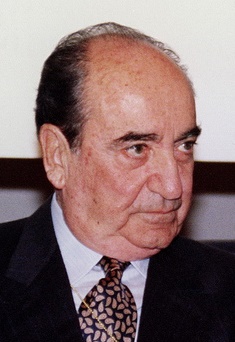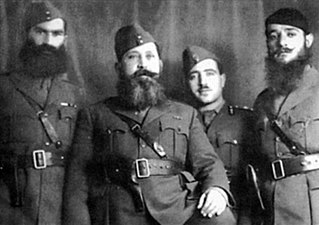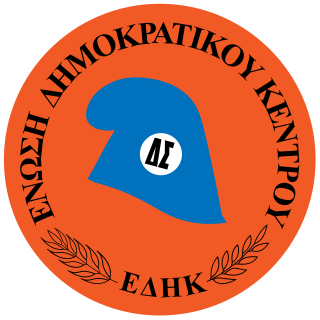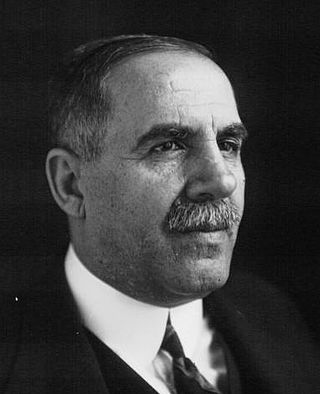The history of modern Greece covers the history of Greece from the recognition by the Great Powers — Britain, France and Russia — of its independence from the Ottoman Empire in 1828 to the present day.

Georgios Papandreou was a Greek politician, the founder of the Papandreou political dynasty. He served three terms as prime minister of Greece. He was also deputy prime minister from 1950 to 1952, in the governments of Nikolaos Plastiras and Sofoklis Venizelos. He served numerous times as a cabinet minister, starting in 1923, in a political career that spanned more than five decades.

Konstantinos Mitsotakis was a Greek politician who was Prime Minister of Greece from 1990 to 1993. He graduated in law and economics from the University of Athens. His son, Kyriakos Mitsotakis, was elected as the Prime Minister of Greece following the 2019 Greek legislative election.
Venizelism was one of the major political movements in Greece from the 1900s until the mid-1970s.
The Liberal Party was a major political party in Greece during the early-to-mid 20th century. It was founded in August 1910 by Eleftherios Venizelos and went on to dominate Greek politics for a considerable number of years until its decline following the Second World War. Among its most well-known members, apart from Venizelos, were Alexandros Papanastasiou, Nikolaos Plastiras, Georgios Papandreou and Konstantinos Mitsotakis.

The Centre Union was a major centrist political party in Greece, created in 1961 by Georgios Papandreou.

Sofoklis Venizelos was a Greek politician who served three times as Prime Minister of Greece: in 1944, 1950 and 1950–1951.

Parliamentary elections were held in Greece on 31 March 1946. The result was a victory for the United Alignment of Nationalists, an alliance that included the People's Party, the National Liberal Party, and the Reform Party, which won 206 of the 354 seats in Parliament. As a result, Konstantinos Tsaldaris became Prime Minister leading a right-wing coalition. Nonetheless, he soon decided to resign in favor of Themistoklis Sophoulis, who led a government of national unity during the entire second phase of the civil war (1946–1949). One of the priorities of the new government was the proclamation of a plebiscite for the restoration of the Greek monarchy.

Panagis Tsaldaris was a Greek politician who served as Prime Minister of Greece twice. He was a revered conservative politician and leader for many years (1922–1936) of the conservative People's Party in the period before World War II. He was the husband of Lina Tsaldari, a Greek suffragist, member of Parliament, and the Minister for Social Welfare.

Themistoklis Sofoulis or Sophoulis was a prominent centrist and liberal Greek politician from Samos Island, who served three times as Prime Minister of Greece, with the Liberal Party, which he led for many years.

The Union of the Democratic Centre is a social liberal political party in Greece.

Centre Union – New Forces was the continuation of the Centre Union party of George Papandreou after the military junta. It was the merger of a Centre Union fraction led by Georgios Mavros and the Movement of New Political Forces (KNPD).

Emmanouil Tsouderos was a political and financial figure of Greece. During World War II, he was the internationally recognized Prime Minister of Greece from 1941 to 1944 as head of the Greek government in exile. He resigned in 1944, following a mutiny in the exiled armed forces

The National Progressive Centre Union was a Greek Venizelist political party. It was founded in 1950 by Nikolaos Plastiras, and formed a government with other Centrist parties after the 1950 legislative election. It later formed another coalition government after the resignation of Sofoklis Venizelos as Prime Minister, and another one in 1951 with Venizelos. After Plastiras's death in 1953, the party continued to exist, but was subsumed into the Centre Union in 1961.

Georgios Kafantaris was a Greek politician, a political personality of the first half of the 20th century and a prominent member of the Venizelist party.
The Deputy Prime Minister of Greece is the second senior-most member of the Greek Cabinet. Despite the English translation of the title, he does not actually deputize for the Prime Minister, rather it is a mostly honorific post for senior ministers, and is usually combined with another senior government portfolio or a coordinating role over several ministries. The post is not permanent, rather it is created on an ad hoc basis, usually for the leaders of junior parties in coalition cabinets, and may be held by more than one person at once.
The Minister of State is a position within the Cabinet of Greece.
Stavros Kostopoulos was a Greek banker and politician.












